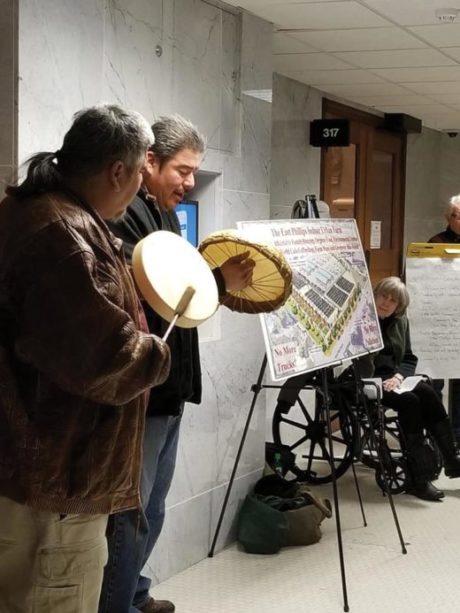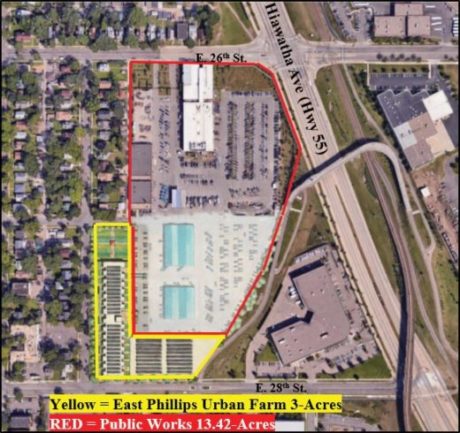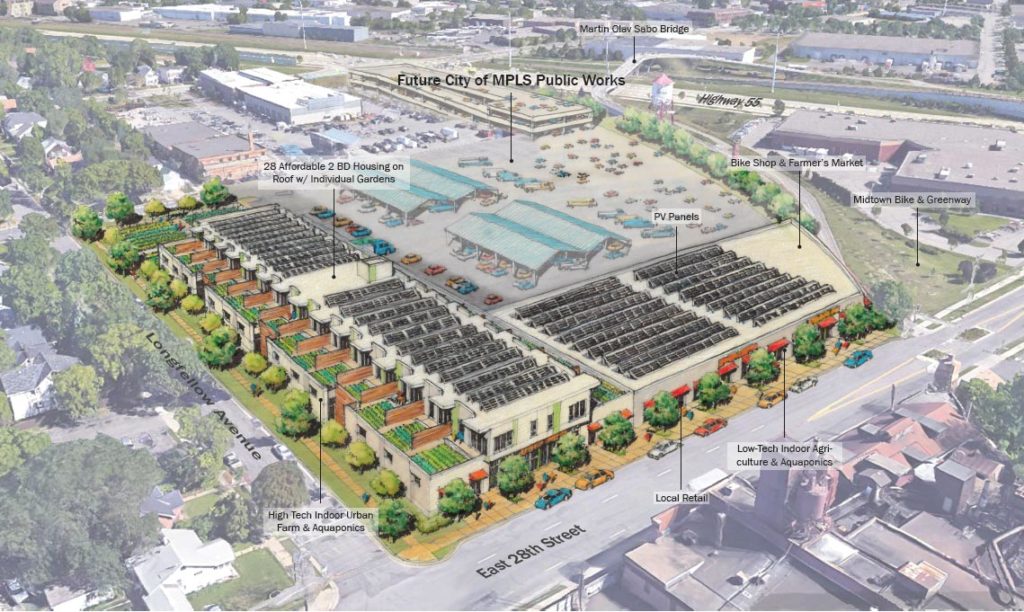Brief Background by The Alley Newspaper
Land and buildings in every sector of Phillips have been challenged by large institutions, smaller non-profits, businesses, public schools, parks, and the City and County since the City was founded. The colonizing of this land and its people centuries ago seems to have set a pattern that is extremely difficult to overcome. Phillips has suffered many losses throughout the large, 21,000 population neighborhood, but the southeast corner of Phillips has had an unequal amount of threats and (a few successes) like the 12-year-long Garbage Transfer Station struggle (with HN County and the City of Mpls.) and a second Incinerator threat (with a private enterprise having “complicated” ownership) a few years later. An arsenic superfund site existed on land connected to the Roof Depot site. The defeat of building a Garbage Transfer Station avoided 750 garbage compactor trucks driving through Phillips every day. Now the City with a different City Council is threatening Phillips by adding 494 trucks driving through Phillips everyday and not conforming to state and environmental regulations to do it. Phillips is continuing the six-year long struggle to use at least a portion of the Roof Depot 7-acre site if not the whole parcel as originally planned. Here is their next step of trying to meet the City part way.
East Phillips Neighborhood Institute, EPNI, requests official City Council hearings on health impact assessment and environmental justice

Little Earth drummers and Karen Clark amongst 50 neighbors at City Hall on Jan.17, 2020. They attended to express their support for the grassroots efforts of Phillips neighbors and organizations to create an environmentally sound development with affordable housing, food production, and small business employment opportunities called the Urban Farm.
By DEAN DOVOLIS, EPNI President and CASSIE HOLMES, EPNI Vice President
East Phillips Neighborhood Institute (EPNI) and many concerned citizens are requesting the Minneapolis City Council to do two things:
1. To hold a City Council Hearing on the findings of the recently published South Side Green Zone Health Impact Assessment for the Phillips Community (HIA). This publicly funded study documents health inequities that expose the environmental injustice that has resulted from decades of environmental racism and social and economic disparities in Phillips, especially East Phillips. It makes strong recommendations for positive corrective actions by the City of Minneapolis. However we believe that these recommendations are being violated in the city”™s proposal for expanding its Public Work”™s Water Yard in East Phillips. This HIA research was done by neighborhood groups with state funding and was not published until November 2019. We want the City to hold an official hearing to look at the new evidence being brought forward and to seriously consider the HIA report”™s strong recommendations. The 2008 Clark/Berglin State of Minnesota law requiring cumulative health impact analysis for polluters in East Phillips is cited in the study and must also be applied to the City”™s proposal and be enforced.
2. To hold an official City Council Hearing on the community-based, community-led plan to begin to address environmental injustice in East Phillips. This publicly funded plan would create a year-round indoor urban farm at the former Roof Depot site with green jobs and job training, 23 units of very low income affordable housing, entrepreneurial space for cultural markets (including Native American and other cultural crafts), a youth-led World Cafe, a certified kitchen, a bicycle shop and more. This plan would bring tangible solutions to address the recommendations of the HIA and other economic and social justice community development efforts, but it has never been given an official hearing by the Minneapolis City Council. This is an incredible community asset that begins to address Phase 2 of the HIA”™s recommendations.
On Friday, January 17, 2020, EPNI was pleased to learn that there WILL BE A HEARING ON THESE ISSUES, announced by Council Vice President Andrea Jenkins. It is scheduled for a meeting of the City Council”™s Committee of the Whole, which Council Member Jenkins chairs. The hearing will be January 29, 2020, at 1:30pm. We are grateful for this opportunity and ready and willing to work with the City on this critical Environmental Justice work.

This aerial photograph is of 3-Acres Required for Urban Farm of the 7”“Acres of the entire Roof Depot Site that was all originally to be used by implementation of the ENPI Proposal until City of Mpls. undermined the Proposal and planning on demolishing the 230,000 square foot “Sears, 1947 Warehouse later Office/Warehouse of Roof Depot Company. Demolishing of building will unearth arsenic contaminated soil discovered and regulated during h recent Arsenic Superfund Clean-up of the nearby Arsenic Triangle at 28th Street and Hiawatha Av. The existing City of Mpls. Maintenance Facility is at the top of the photo at 26th St. and Hiawatha Av. and remains the predominant reason the City is preferring this site of any other in the City. There is a desire to amass as much adjacent land as possible for extensive City use.

Brief history of East Phillips Indoor Urban Farm Project
The East Phillips Indoor Urban Farm Project – Epnifarm.org – is a 7-acre site previously owned by the Roof Depot Company. Before that, it was a Sears warehouse. It is adjacent or near: (1) Midtown Green Way. (2) Hiawatha Ave/State Highway 55, (3) Little Earth Housing, (4) Cedar Ave/State Highway 77, (5) Hi-Lake Shopping Center (6) Midtown YWCA, (7) and Midtown Light Rail Transit Station. It is a short midway distance between MSP Airport/Mall of America and downtown Minneapolis and the U.S. Bank Stadium. It could be considered a developer”™s dream site! Some neighbors who have been around for awhile find it difficult to not anticipate that this valuable land is being amassed for just this eventual reason, even if decades from now. City Staff has admitted that choice of the City for this site rather than another neighborhood where neighbors would like having it, is because of the proximity of the current City Facility at 26th and Hiawatha. This may be interpreted as a heads-up that sometime soon the City will seek expanding the City property across Longfellow Av and 28th Street; a domino-tipping theory.
In 2014, neighbors in East Phillips began planning a mixed use of the site for: a 60 to 75 employee, year-round, indoor aquaponic farm and urban farm training; 28 units of affordable housing; the youth-led World Cafe and market; a community accessible commercial kitchen; and bicycle repair and assembly shop. Negotiations had begun with Roof Depot with full transparency over several months. A year later, the City began to compete for the land and then threatened eminent domain. East Phillips Improvement Association, Little Earth Housing Association, and other organizations formed the East Phillips Neighborhood Institute (EPNI). This new organization, EPNI, was to be the facilitator of the joint development project that had procured State of MN start-up planning monies with help from Phillips resident and State Representative Karen Clark before she left office.
The City Council of Minneapolis has since given approval for plan “A,” which will demolish the historic 230,000 square foot, 1947 Sears warehouse (Roof Depot) site. In addition, the City refused to conduct a voluntary Environmental Assessment that would inform Phillips as to what will possibly be uncovered as bulldozers once again dig into the nearby Arsenic Triangle. Presuming the MPCA grants the required permits, the City (who is simultaneously promoting a zero waste direction) will demolish and haul away the Roof Depot building and as much contaminated soil as they deem necessary. Then they will begin what will eventually be a parking ramp for 480 employee vehicles, and the infrastructure for 494 City owned vehicles, coming and going on a daily basis. This appears to be in opposition to state regulations for environmental protection within the Phillips Community, set into law and co-authored by Representative Karen Clark and Senator Linda Berglin when they were still in state office.









